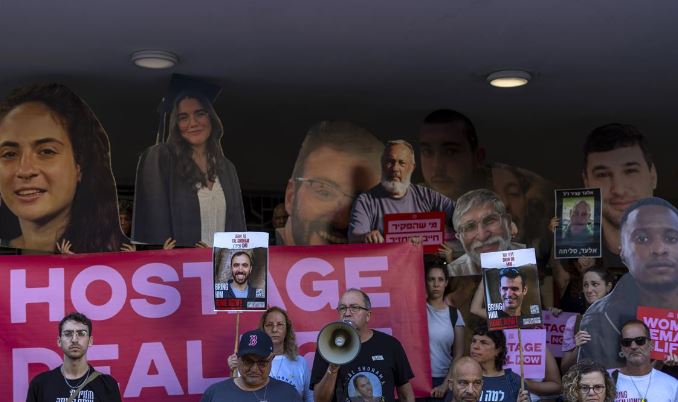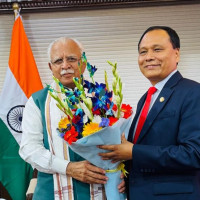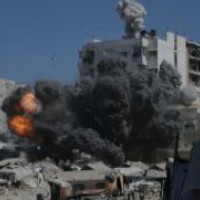- Thursday, 30 October 2025
Mediators to hold Gaza cease-fire talks
Doha, Qatar, Aug. 16: International mediators were set to hold a new round of talks Thursday aimed at halting the Israel-Hamas war and securing the release of scores of hostages, with a potential deal seen as the best hope of heading off an even larger regional conflict.
The United States, Qatar and Egypt were to meet with an Israeli delegation in Qatar as the Palestinian death toll from the 10-month-old war climbed past 40,000, according to local health authorities. Hamas, which is not expected to participate directly, accuses Israel of adding new demands to a previous proposal that had U.S. and international support and to which Hamas had agreed in principle.
A cease-fire in Gaza would likely calm tensions across the region. Diplomats hope it would persuade Iran and Lebanon's Hezbollah to hold off on retaliating for the killing of a top Hezbollah commander in an Israeli airstrike in Beirut and of Hamas' top political leader in an explosion in Tehran.
The mediators have spent months trying to hammer out a three-phase plan in which Hamas would release scores of hostages captured in the Oct. 7 attack that triggered the war in exchange for a lasting cease-fire, the withdrawal of Israeli forces from Gaza and the release of Palestinians imprisoned by Israel.
Both sides have agreed in principle to the plan, which U.S. President Joe Biden announced on May 31. But Hamas has proposed “amendments” and Israel has suggested “clarifications,” leading each side to accuse the other of making new demands it cannot accept.
Hamas has rejected Israel's latest demands, which include a lasting military presence along the border with Egypt and a line bisecting Gaza where it would search Palestinians returning to their homes to root out militants. Hamas spokesperson Osama Hamdan told The Associated Press the group is only interested in discussing the implementation of Biden's proposal and not in further negotiations over its content.
A Palestinian official who closely follows the negotiations said Hamas would not take part in Thursday's talks but that its senior officials, who reside in Qatar, were ready to discuss any proposals from the mediators, as they have in past rounds.
Prime Minister Benjamin Netanyahu denies Israel has made new demands, but he has also repeatedly raised questions over whether the cease-fire would last, saying Israel remains committed to “total victory” against Hamas and the release of all the hostages.
The two sides are also divided over the details of the hostage-prisoner exchange, including who among the Palestinian prisoners would be eligible for release and whether they would be sent into exile. Hamas has demanded the release of high-profile militants convicted of orchestrating attacks that killed Israelis.
The most intractable dispute has been over the transition from the first phase of the cease-fire — when women, children and other vulnerable hostages would be released -- and the second, when captive Israeli soldiers would be freed and a permanent cease-fire would take hold.
Hamas is concerned that Israel will resume the war after the first batch of hostages is released. Israel worries that Hamas will drag out the talks on releasing the remaining hostages indefinitely. Hamdan provided documents showing Hamas had agreed to a U.S. bridging proposal under which talks on the transition would begin by the 16th day of the first phase and conclude by the fifth week.
More recently, Hamas has objected to what it says are new Israeli demands to maintain a presence along the Gaza-Egypt border and a road dividing northern and southern Gaza. Israel denies these are new demands, saying it needs a presence along the border to prevent weapons smuggling and that it must search Palestinians returning to northern Gaza to ensure they are not armed.
The demands were only made public recently. Hamas has demanded a full Israeli military withdrawal, which was also part of all previous versions of the cease-fire proposal, according to documents shared with the AP that were verified by officials involved in the negotiations.
The war began when Hamas-led militants stormed across the heavily guarded border on Oct. 7 in an attack that shocked Israel's vaunted security and intelligence services. The fighters rampaged through farming communities and army bases, killing some 1,200 people, mostly civilians.
They abducted another 250 people. Over 100 were released during a weeklong cease-fire in November, and around 110 are believed to still be inside Gaza, though Israeli authorities believe around a third of them died on Oct. 7 or in captivity. Seven were rescued in military operations. (AP)






-original-thumb.jpg)










